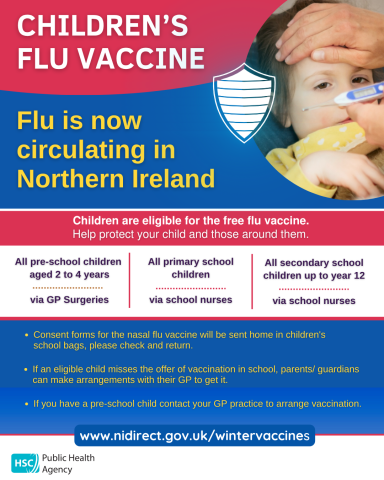Don’t underestimate the flu – give your child protection with the vaccine

The Public Health Agency (PHA) is highlighting the need for kids to get vaccinated against flu, with the agency’s latest surveillance data showing that influenza activity continues to increase, with the highest positivity rate in children aged 5 – 14 years.
In Northern Ireland, all pre-school children, and primary school aged children from primary one to year 12, are eligible for the free flu vaccine, which is given as a simple nasal spray.
Dr Amanda McCullough, Specialty Registrar in Public Health at the PHA, said: “Flu is not just a bad cold, and last year 862 children and young people had a hospital admission with influenza in Northern Ireland. The flu vaccine offers vital protection for all school aged children, not just those with long-term health conditions. Flu spreads more easily among children in winter due to them spending more time indoors, and in close proximity in classrooms. Vaccinating children helps to protect them from severe illness, keeping them in school rather than at home sick, and it also helps to protect those around them.”
Trust school nursing teams are currently delivering the free nasal flu vaccination programme to primary and secondary school children (up to year 12) across Northern Ireland. Parents/ guardians should check schoolbags for flu vaccine consent forms, and sign and return them before the school nurses visit their child’s school to help make sure they don’t miss out.
Getting the vaccine when it’s offered at school means children can start benefitting from the protection it offers without delay. It’s also very convenient, as it just requires the form to be signed and sent back in time. If an eligible child misses the offer of vaccination in school, parents/ guardians can make arrangements with their GP to get it.
In addition, pre-school children will receive the vaccine via their GP practice, so if you have not already heard from your GP practice, contact them to find out what their vaccination arrangements are.
Amanda continued: “The nasal flu vaccine Fluenz® was first introduced in 2013. The vaccine has an excellent safety record. Fluenz® contains viruses that have been weakened to prevent it causing flu, meaning it will help your child build up immunity in the same way as a natural infection, but without the nasty symptoms. The nasal vaccine is easy to give and painless. Each child who has the nasal spray vaccine gets the best protection against flu. It is also considered to be the best at reducing the spread of flu, helping children protect one another and others who might be vulnerable to flu. Some children may experience mild side effects, but serious side effects are very rare.
“As well as getting their child vaccinated, parents should encourage their children to exercise good respiratory and hand hygiene.”
How you can help yourself and your child stay well this winter
- Stay off school when sick – know when to stay home to stop the spread. If you have a high temperature stay home until you feel better or if you have diarrhoea and/or vomiting, you should stay home for at least 48 hours after the last episode;
- ‘Catch it. Bin it. Kill it’ – carry tissues and use them to catch coughs or sneezes, then bin the tissue;
- Wash your hands – regularly wash your hands throughout the day and remember hands should always be washed after coughing or sneezing, before eating or drinking and after using the toilet;
- Speak to your pharmacist about over-the-counter remedies if you are feeling unwell and remember antibiotics don't work on viruses.
Amanda concluded: “Flu strains can change throughout the season, but no matter what strains are circulating here this winter, the vaccine offers important protection, particularly against developing serious illness and being hospitalised. We strongly encourage all those eligible to get vaccinated against flu as soon as possible – it remains our best defence.”
Further details on the winter vaccination programme can be found at www.nidirect.gov.uk/wintervaccines
- The influenza annual surveillance report, Northern Ireland 2024-2025 is available at www.publichealth.hscni.net/influenza-annual-surveillance-report-northern-ireland-2024-2025
- Seasonal influenza vaccination programme coverage is available at www.publichealth.hscni.net/directorate-public-health/health-protection/vaccination-coverage
- Further details on the winter vaccination programme can be found at www.nidirect.gov.uk/wintervaccines
- View information on the RSV vaccine for pregnant women at www.publichealth.hscni.net/RSV-pregnancy
